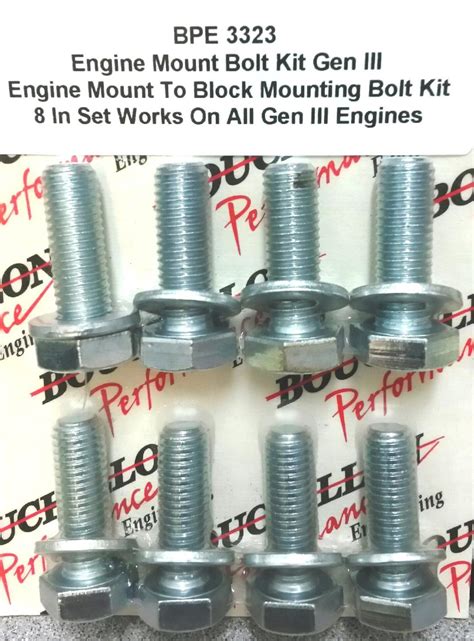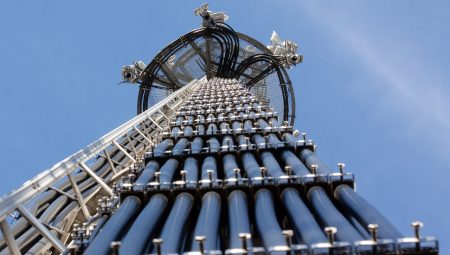Explore the significance, types, common issues, and maintenance of engine mount bolts to ensure optimal engine performance and longevity.When it comes to engine stability and vehicle performance, engine mount bolts play a critical yet often overlooked role. These unassuming fasteners secure the engine to the vehicle’s chassis, minimizing vibrations and providing the necessary support during operation. Understanding the significance of engine mount bolts is essential for both car enthusiasts and everyday drivers, as they can directly impact engine longevity and driving experience. In this blog post, we will explore the various types of engine mount bolts, common issues that can arise, and how to choose the right ones for your vehicle. Additionally, we will provide essential tips for proper maintenance, ensuring that your engine remains securely in place for miles of safe driving. Let’s dive into the world of engine mount bolts and unlock the secrets to keeping your engine firmly anchored.
The Importance of Engine Mount Bolts
Engine mount bolts serve a crucial role in ensuring the engine’s stability and alignment within a vehicle, as they not only hold the engine securely in place but also absorb vibrations generated by the engine during operation, contributing significantly to the overall performance and comfort of the driving experience. In addition to providing structural support, these bolts facilitate the proper functioning of various components associated with the engine, and any compromise in their integrity could lead to severe vehicle malfunctions, including misalignment and increased wear on other engine parts.
Moreover, the integrity of engine mount bolts is directly related to the safety of the vehicle, as loose or damaged bolts could lead to catastrophic failures, with the engine potentially shaking loose or moving excessively, which could endanger the lives of both the driver and passengers. It is worth noting that modern engines are designed to operate under varying conditions and produce significant torque; thus, the ability of engine mount bolts to withstand these forces endlessly is critical for maintaining the vehicle’s reliability over time, underscoring the necessity of using high-quality bolts that meet stringent engineering standards.
In summary, the importance of engine mount bolts cannot be understated, as they are indispensable in providing necessary support and stability, ensuring that the engine operates efficiently while mitigating noise and vibrations that can compromise the vehicle’s overall driving experience. Therefore, regular inspection and maintenance of these bolts should be a priority for vehicle owners, as neglecting their condition can lead to substantial repair costs and safety hazards.
Types of Engine Mount Bolts
When it comes to understanding the types of engine mount bolts, it is crucial to recognize that the various materials, sizes, and designs significantly influence the performance and durability of an engine’s mount, which in turn ensures optimal engine operation and protects the overall integrity of the vehicle structure. Specifically, engine mounts are typically fastened using a range of bolts, including grade 8.8 bolts, commonly made from carbon steel and providing good tensile strength, and grade 10.9 bolts, which offer even higher resistance to shear forces due to their alloy composition.
Moreover, one should also note the prevalence of cap screws and hex bolts, which are often favored in the automotive industry for their robust construction and ability to maintain tight connections under extensive vibration and thermal cycling. These fasteners come in various sizes to accommodate the unique specifications of different engine models, and they are typically available in several coatings, such as zinc-plated or black oxide, which can offer additional protection against rust and corrosion, thereby extending their service life.
Finally, it is essential to highlight that while the selection of an appropriate type of engine mount bolt is critical, so too is the understanding of its specific applications, as using the wrong type of bolt could lead to inadequate performance, potential engine misalignment, or even catastrophic failure, emphasizing the necessity of a well-informed approach to the choice of engine mount bolts in any automotive maintenance or assembly process.
Common Issues with Engine Mount Bolts
Engine mount bolts, which serve as the critical fasteners connecting the engine to the vehicle’s frame, are essential for maintaining stability and reducing vibrations during operation; however, they can encounter several common issues that may jeopardize the integrity of the engine system.
One prevalent issue with engine mount bolts is corrosion; over time, exposure to moisture, road salt, and environmental contaminants can lead to the deterioration of these bolts, compromising their strength and potentially leading to engine misalignment or even failure.
Another common concern is wear and tear, as engine vibrations can cause bolts to loosen or even break, necessitating regular inspections and possible replacements to ensure that the bolts can withstand the stresses of prolonged use, highlighting the importance of preventive maintenance in preserving the overall health of the vehicle.
Additionally, improper installation or the use of incorrect bolts can result in issues such as inadequate tightening, which may eventually lead to the engine’s instability; thus, it is crucial for vehicle owners to be aware of these common problems and to consult with professionals when addressing any concerns related to their engine mount bolts.
In summary, being vigilant about the conditions of engine mount bolts, recognizing the symptoms of potential problems, and understanding the implications of neglect can significantly extend the lifespan of these essential components and contribute to a safer driving experience.
Choosing the Right Engine Mount Bolts
When it comes to selecting the appropriate engine mount bolts, several crucial factors need to be taken into account, ensuring that not only the performance of the vehicle is optimized but also its safety and longevity; this includes understanding the specific vehicle requirements, the material strength of the bolts, and the dimensions necessary for a perfect fit.
Primarily, it is essential to know the manufacturer specifications regarding the engine mount bolts as these specifications often outline the thread pitch, diameter, and length of the bolts that are compatible with your engine, thus preventing any mishaps during installation and ensuring a secure connection that can withstand the vibrations and stresses typically experienced in an operational vehicle.
Additionally, one should consider the material composition of the bolts; commonly, engine mount bolts are made from carbon steel, stainless steel, or alloy steel, each offering different levels of performance and resistance against various environmental factors such as rust and corrosion, and selecting the right material can significantly affect the durability and reliability of the engine moun
Proper Maintenance for Engine Mount Bolts
Regular maintenance of engine mount bolts is crucial for ensuring the stability and performance of an engine, as these small yet significant components play a fundamental role in securing the engine to the chassis, thereby minimizing vibrations and maintaining alignment during operation.
To ensure the longevity and effectiveness of engine mount bolts, it is important to frequently inspect them for any signs of wear, such as rust, corrosion, or deformation, which could impact their integrity and functionality, and addressing these issues promptly can prevent potential failures that may lead to more extensive damage to the engine or surrounding components.
In addition to regular inspections, it is advisable to adhere to the manufacturer’s specifications when it comes to torque settings during installation, as over-tightening or under-tightening can adversely affect the performance of engine mount bolts; therefore, utilizing a reliable torque wrench and regularly checking the torque settings as part of your maintenance routine
Frequently Asked Questions
What are engine mount bolts?
Engine mount bolts are fasteners used to secure the engine to the vehicle’s chassis, ensuring stability and minimizing vibration.
Why are engine mount bolts important?
They are crucial for keeping the engine firmly attached, which helps maintain proper engine alignment and prevents excessive movement during operation.
How do I know if my engine mount bolts need replacement?
Signs of wear may include excessive vibration, engine noise, or visible damage to the engine mounts themselves.
What tools are needed to replace engine mount bolts?
Typically, you’ll need a socket set, torque wrench, and possibly a breaker bar to loosen stubborn bolts.
Can I replace engine mount bolts myself?
Yes, if you have basic mechanical skills and the right tools, you can replace engine mount bolts yourself, but it’s important to follow safety procedures.
What should I torque engine mount bolts to?
Refer to your vehicle’s service manual for the appropriate torque specifications for your specific engine mount bolts.
What can happen if engine mount bolts are loose?
Loose engine mount bolts can lead to increased engine vibration, misalignment, and potential damage to other components in the vehicle.





